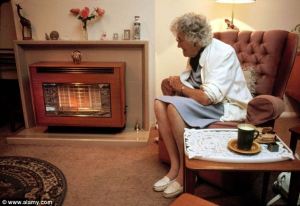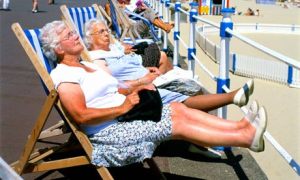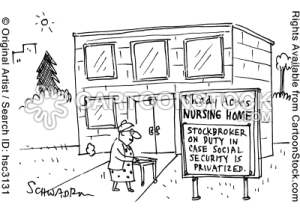
Figures released yesterday reveal a sharp rise in deaths across Britain last year, predominantly of women over 85 in the poorest areas. Sheffield University’s Professor Danny Dorling, who studied the numbers suggests the data may portend the first fall in British life expectancy since the Second World War. Cameron and his government are solving the problem of our ageing population by withdrawing the life support of properly funded, qualified and committed care services for old people.
The ‘Mystery’ Rise in Deaths

The figures for England and Wales were taken from the Office of National Statistics, and for Scotland, the General Register for Scotland. They showed a 5% rise in deaths above ordinary numbers, and it was poor, elderly women that accounted for the majority of the rise.
But this should come as no surprise. It was exactly what researchers predicted in 2008, after extensive research revealed that the health inequality gap (the difference in life expectancy between rich and poor) in Britain was already bigger than it was during the Great Depression of the 1930’s. Their review of deaths between 1921 and 2007 revealed that poor people were dying more often and younger than richer people, and at an ever accelerating rate. Although life expectancy was rising overall, persistent socio-economic inequalities meant that the life expectancies of the poorest failed to keep pace with the average. Writing in the British Medical Journal at the time, the University of Bristol and Sheffield researchers stated:
“By 2007, for every 100 people under 65 dying in the best-off areas, 199 were dying in the poorest. This is the highest relative inequality recorded since at least 1921.” They added “The economic crash of 2008 might precede even greater inequalities in mortality between areas in Britain,”
Therefore it should come as no surprise that if poor people were dying at twice the rate of rich people six years ago, that this final stage of the neoliberal apocalypse of our public services would have exacerbated the situation – exactly as we were warned it would, back in 2008.
Old People are not the Problem

Whilst this affects everyone, it affects the elderly the most. By 2009, the UK’s elderly were already the fourth poorest in the EU, behind Romania, with a third of all over 65s living in poverty. Things have only gotten worse.
The elderly have now joined the ranks of the sick, the disabled, the young and the unemployed as a ‘problem’ demographic to our government. Essentially, anyone who isn’t in full time work and earning a taxable income is considered a burden – a drain on the system in these times of austerity.
This entire line of argument is simply absurd. Our economy needs to fit the demographics it exists to serve, not the other way round. If a person’s shoes are too tight, they need bigger shoes. Using this government’s logic, the person would be asked to hack off their toes.
The privatisation of our core services – energy, transport, utilities, social care, residential homes, and nursing homes – has meant that the cost of living, especially as an elderly person, has risen exponentially. It costs a lot to be old now because we thought it was a good idea to allow people to profit from our most basic requirements – warmth, food and water, shelter and care.
In the UK today over 90% of all care home provision (up from 61% in 1990) to elderly people is in the independent/private sector after the public sector was encouraged to outsource provision in an effort to cut costs. The same period has seen an astronomical rise is the cost of care home places.
Today, the average cost of a single room in a care home has risen to over £27,000 a year. This is higher than the average UK annual wage (£26,000) and more than double the average annual pension income of £13,208. In fact since 2011, care home costs have risen at twice the rate of inflation, whilst standards of care have slipped.
Elderly people who had paid for their homes in the hopes of leaving an asset for their families, have had to sell their homes simply to have their most basic care needs met for the final years of their lives. It is estimated that 40,000 elderly people a year are selling their homes for just this purpose, in aims to cover the average £100,000 care home costs to cover the final years of their lives. Whilst the coalition plan to implement a £75,000 cap in the contributions a person makes to their care home costs, a) they have stalled the policy until after the next election and b) it won’t include accommodation costs, which are the bulk of the issue. This is no help at all.
One might expect that for these breath-taking sums we might have the finest care homes in the world. Yet, last year, the regulatory body for the UKs care homes The Care Quality Commission (CQC) published a damning report that showed that more than half of all elderly and people with disabilities in care homes were being denied basic care.
The report showed that people suffering incontinence were waiting more than two weeks for a consultation on their condition in more than 40% of care homes for the elderly surveyed. One might think perhaps this was some failing, but this was classed as success; 40% of the care homes surveyed set themselves a target of 90 days (that’s three months!), to make such a basic check up for a resident.
More worrying is that the data used for the study only covers 2010, so does not even take into account the sweeping cuts implemented since. This is the sorry state of care the elderly lived in prior to the ideological austerity we have seen sweeping the UKs public services. Things did get worse; over 40 care homes were closed down by the Care Quality Commission last year for providing substandard care including: verbal & physical abuse of patients, medicines not being managed safely, poor sanitary conditions and a lack of medical and nursing care.
Not only are our impoverished elderly dropping like flies, but they are dying in the most appalling conditions. Just one of the women over 80 in these statistics would have been 81 year old Gloria Foster, who suffered a lonely and excruciating death from starvation and thirst, trapped in her own bed, having been left without her essential care for nine days.
The Cuts and Sell Offs Continue Apace

In the same week that Mrs Foster lay dying as a result of failures in the care system, Birmingham City Council announced crushing half a million pound a year cuts of provision of home care for those like her. Birmingham is not alone. The Mayor of Bristol approved the Council’s decision to close eight of its eleven council run care homes in January this year, and in February two further closures were announced in Peterborough.
In fact the same wave of closures is taking place in Haringey, Anglesey, Maldon, Argyle & Bute, Ilkeston, Derby, and many other towns and cities up and down the country as austerity drives council’s to cut costs despite growing need.
Meanwhile, the private sector is not picking up the slack as promised. There has been an overall drop in care homes places of more than 4% since the Coalition took office, meaning a little under one in every twenty care homes in the UK has closed. Most of this has happened quietly, but there have been notable large scale closures such as large care home companies such as Southern Cross going into insolvency. This has largely been blamed on the failure of local councils to afford the rises in the costs of care brought about by high property rents and other increased costs.
However, surely the bigger problem is that this important service was ever abandoned to the whims of ‘market forces’ at all. If we built and owned the care homes, changes in rents would make no impact on care costs. If we properly integrated the care of elderly people into our state social care system, we would not need to meet the rising prices of external providers trying to make ever increasing profits. If the care of elderly people was a matter for all of us, under the responsibility of government, we could better hold people to account for their failures. Instead we have abandoned our elderly people to the whims of market forces; they suffer the indignity of not having their most basic care needs met and have to sell their homes for the privilege.
Even if elderly people are healthy enough to avoid the nursing home, they face stark choices such as whether to eat, or heat their own homes due to astronomical rises in energy prices. These are people who have worked over 40 years, paid their dues, many even fought a war on our behalf – for this?
It’s the Economy, Stupid? It’s a Stupid Economy

The neoliberal model of privatised, for profit, core services simply does not work. Any system which has us seeing living longer, healthier lives as some kind of problem is no system worth having. Labour sought and failed to address the problem of profiteering by ramping up the provision of state support, so that tax payers funded the profits. The Coalition are simply cutting that support and leaving the elderly to go cold, hungry and, more quickly, to die. Both these scenarios are ultimately unworkable and undesirable from both an economic and a moral perspective. Are you willing to live in a country which abandons its elderly? If not, then it’s time to roll up your sleeves and do something about it.
Get Involved!
Campaign to End Loneliness – an inspirational idea to create connections between the generations and put an end to loneliness in old age.
Compassion In Care – seeks to ensure that care is compassionate across the country, check out their website to see how you can support.